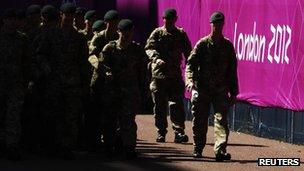G4S Olympic failure prompts ministers to 'think again' over outsourcing
- Published

Some 4,700 members of the armed forces had to stand in for G4S staff at the Olympics
Two senior ministers have questioned the use of private firms to deliver certain services in the aftermath of G4S security failures at the Olympics.
Troops were drafted in at the Games after the private company was unable to provide enough security guards.
Culture Secretary Jeremy Hunt said it had made him "think again" about the default use of private contractors.
And Defence Secretary Philip Hammond said only the state could provide "large-scale" contingency back-up.
G4S had a £284m contract to provide 10,400 staff for Olympic events but could not supply enough personnel, leaving some 4,700 members of the armed forces to stand in.
The firm described its failures as a "humiliating shambles" and was forced to apologise.
'Open mind'
On Monday G4S said it had donated £2.5m to the armed forces, with Mr Hammond saying the donation would "go some way" to recognising the extra work placed on the military.
Some 18,000 service personnel provided support at London 2012, including Army, Royal Navy and Royal Air Force staff, some of whom had their leave postponed.
Labour say the problems demonstrate the dangers of outsourcing security to the private sector and all future private tenders for back-office policing functions should be put on hold.
Asked what lessons he drew from the G4S contract, Mr Hunt told 5 liveBreakfast that it must be remembered that while there had been serious failures in the firm's management, many thousands of their staff had turned up for work and done a great job.
"I think we have to have an open mind," he said. "We will all look at the performance of G4S in this situation and it does make you think again about the use of private companies in certain situations.
"I think you have to be pragmatic about this."
'Two models'
Former businessman Mr Hammond told the Independent, external he went into government with a "starting prejudice" that it should learn from the private sector but now acknowledged that model was not always the best way to handle big projects.
The issues with G4S had been "quite informative" for ministers, he suggested.
"I still think that, in general, there's a lot that the public sector still has to learn from the way private sector does things," he said.
"But... as two models of how to approach a problem you could not get two greater extremes than the G4S model and the military model."
The former was predicated on a "lean structure" with "very little resilience" if things went wrong while the military started by asking itself "what is the job that needs to be done?".
"So G4S were literally hiring people and expecting to deploy them three days later, into a live situation; trying to build up a management structure overnight, at the beginning of the operation.
"The military comes at it from the exact opposite extreme... Whatever it takes we'll pour in massive over-resourcing, massively heavy structures of management."
He added: "What the military primarily deliver is contingent capability and I haven't been able to think of a single large-scale example where a private organisation delivers a contingent capability."
Procurement lessons
The BBC's political correspondent Chris Mason said the comments should not be "over-analysed" in terms of what they meant for government policy on opening up public services.
But he said they showed a willingness by ministers to question the suitability of the "just-in-time" model for private sector delivery to maximise efficiency.
Responding to the interview, a Ministry of Defence spokesman said it was "patently obvious" that there were differences in how the armed forces and G4S had handled security.
But a spokesman said the private sector still offered best practice in many areas and the MoD would be announcing plans soon to introduce greater commercial skills into its procurement chain.
Meanwhile, a senior Royal Air Force officer has suggested the armed forces could take two years to recover from the extra deployment for the Olympics.
"You can't expect them [the armed forces] to go back to normal routine very easily," Wing Commander Peter Daulby told the Guardian., external
The MoD said its contribution to the Olympics was planned to avoid an impact on current operations and "while some individual training and leave may need to be rescheduled, this will be managed and will not impact on operations including the ongoing mission in Afghanistan".
- Published7 January 2014
- Published13 August 2012
- Published24 July 2012